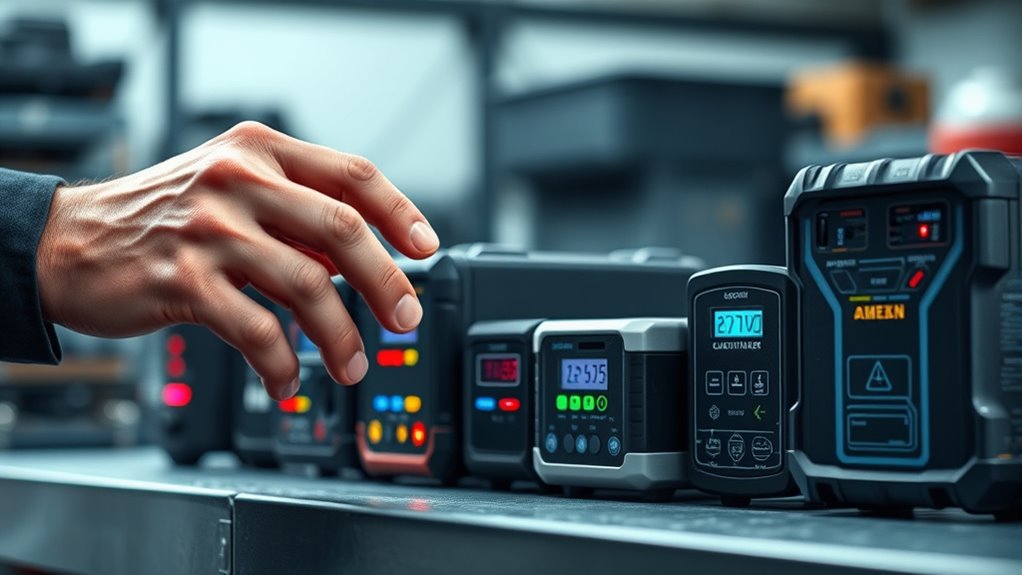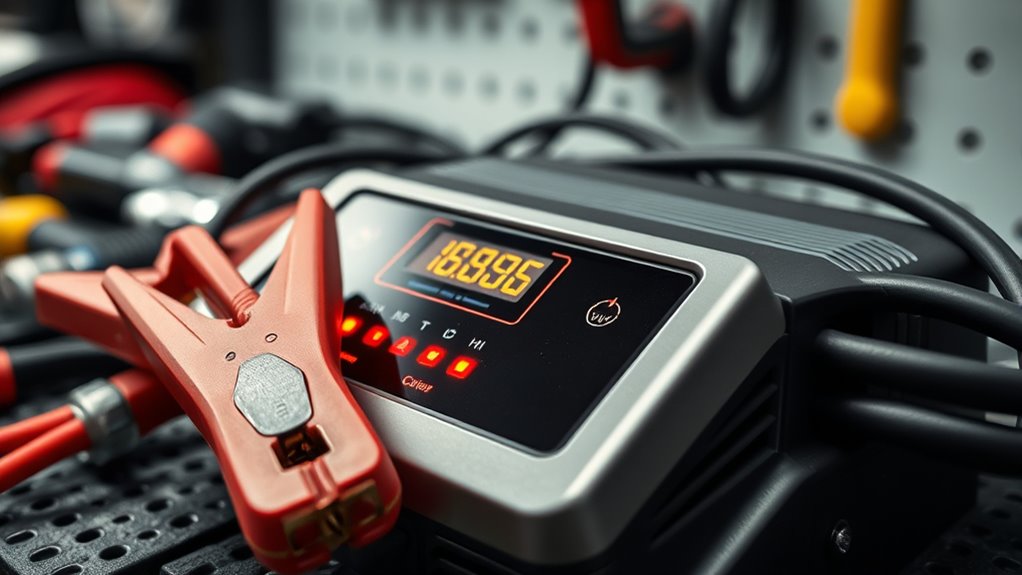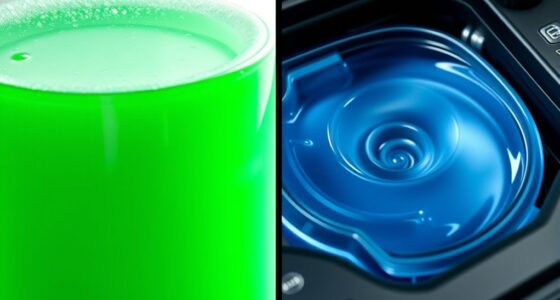To select the right battery charger or maintainer, you need to match it to your battery’s chemistry, such as lead-acid or lithium-ion, to guarantee safety and peak performance. Consider the charging speed you need—fast for emergencies or slow for long-term maintenance—and choose a smart, adjustable model that avoids overcharging or overheating. Using the correct charger extends your battery’s lifespan and keeps your vehicle reliable. Keep exploring to discover how to choose the perfect charger for your specific needs.
Key Takeaways
- Match the charger type and protocol specifically to your battery chemistry (lead-acid, AGM, lithium-ion).
- Choose a charger with adjustable speed or trickle modes for versatile maintenance and safety.
- Consider the charging speed needed based on usage patterns—slow for maintenance, fast for quick recharges.
- Ensure the charger provides smart features that automatically adjust to battery condition for optimal safety.
- Verify compatibility to prevent damage, extend battery life, and maintain vehicle reliability over time.

Choosing the right battery charger or maintainer is essential to guarantee your vehicle’s battery stays healthy and reliable. One of the most important factors to contemplate is how well the charger matches your battery’s chemistry. Different batteries, such as lead-acid, AGM, or lithium-ion, require specific charging protocols to maximize their lifespan and performance. Using a charger that’s incompatible with your battery chemistry can lead to poor charging efficiency, reduced capacity, or even damage over time. For example, a charger designed for lead-acid batteries might not be suitable for lithium-ion batteries, which need a different charging profile. Knowing your battery type helps you select a charger that provides the proper charging method, ensuring safety and longevity.
Choosing the right charger depends on your battery chemistry for optimal performance and safety.
Another key aspect is charging speed. The faster a charger can deliver power, the quicker your battery reaches a full charge. However, it’s not always about the fastest charge available; sometimes, slow and steady charging is better, especially for maintenance or long-term care. Rapid chargers can quickly replenish a drained battery, making them ideal for emergency situations or when you’re pressed for time. But, if you plan to keep your battery in good condition over an extended period, a charger with adjustable charging speed or a trickle charge mode is preferable. These options allow you to control how quickly your battery is charged, reducing stress on the battery cells and preventing overheating or overcharging.
Selecting a charger with the right charging speed also involves considering your vehicle’s usage patterns. For instance, if you only use your vehicle occasionally, a maintainer with a slow, consistent charge might be enough to keep your battery healthy between uses. Conversely, if you regularly need to jump-start or recharge batteries quickly, a high-speed charger can save you time. Keep in mind that some advanced chargers incorporate smart technology that automatically adjusts the charging rate based on the battery’s condition, offering both safety and efficiency. Additionally, choose a charger that is compatible with your battery’s chemistry to ensure optimal performance and safety.
Ultimately, balancing charging speed with compatibility to your battery chemistry and your specific needs ensures ideal performance and long-term health of your vehicle’s battery. Invest in a charger that understands these nuances, and you’ll enjoy a more reliable start every time, along with extending your battery’s lifespan. Taking the time to choose the right charger isn’t just about convenience; it’s about safeguarding your vehicle’s power source and avoiding costly replacements down the line.
Frequently Asked Questions
How Do I Determine the Correct Amperage for My Battery Charger?
To determine the correct amperage for your battery charger, start with amperage calculations based on your battery capacity. A good rule is to select a charger that provides 10-20% of your battery’s amp-hour rating for a safe, efficient charge. For example, if your battery has 50 amp-hours, opt for a charger around 5-10 amps. This guarantees your battery charges properly without overloading or damaging it.
Can I Use a Regular Charger for All Types of Batteries?
Can a regular charger work for all batteries? Think of it like trying to fit a square peg into a round hole—it’s not always compatible. You can’t rely on a universal charger for all types because different batteries, like lead-acid or lithium-ion, have unique chemistry needs. Using the wrong charger risks damage or safety hazards. Always check if the charger suits your battery’s chemistry and offers universal compatibility for safe, effective charging.
What Safety Features Should I Look for in a Charger?
You should look for safety features like automatic shut-off, overcharge protection, and reverse polarity protection to guarantee safe battery safety and prevent accidents. These features help you follow charging precautions, reducing risks like overheating or sparks. A charger with temperature regulation and a clear display for status updates also enhances safety, making sure you charge your batteries properly and avoid damage or injury during the process.
How Long Does It Typically Take to Fully Charge a Battery?
It typically takes anywhere from a few hours to over 24 hours to fully charge a battery, depending on its capacity and the charger’s power output. Smaller batteries with lower capacity charge faster, while larger or deeply discharged batteries require more time. Your charging time also depends on the amperage of the charger; higher amperage chargers can accelerate the process, but always ensure safety and compatibility with your battery’s specifications.
Are There Eco-Friendly or Energy-Efficient Charging Options Available?
While some might say eco-friendly options are just a trend, they actually offer practical benefits. You can choose solar charging, which harnesses sunlight to power your battery sustainably, or opt for smart chargers that optimize energy use and extend battery life. These energy-efficient choices help you reduce your carbon footprint, save on electricity, and ensure your vehicle stays ready, all while supporting a greener future.
Conclusion
Choosing the right battery charger or maintainer is like tending a delicate garden—you nurture it with care, patience, and the right tools. Just as a gardener ensures each plant thrives, you select equipment that sustains your battery’s life and significance. When you make the right choice, you’re not just maintaining a power source; you’re safeguarding an essential connection that keeps your world running smoothly. Trust your instincts, and let your decision be the seed for lasting reliability.









